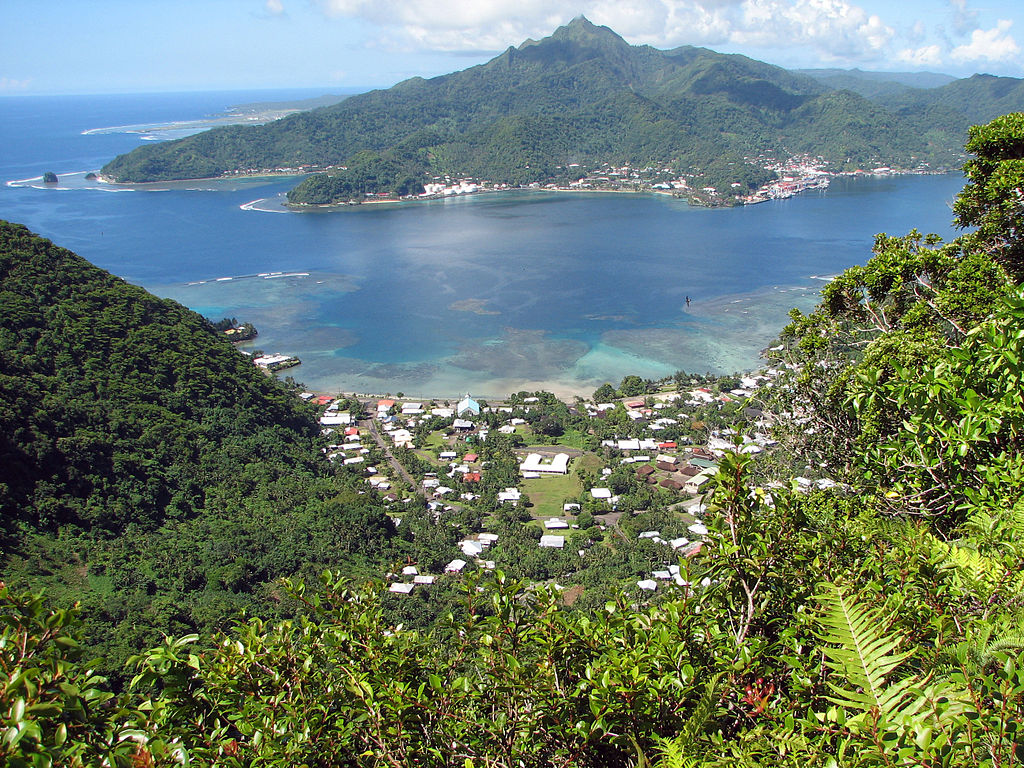Constitutional Citizenship in the U.S. Territories
Withholding the constitutional right to American citizenship from people born in the U.S. territories makes as little sense as withholding citizenship from those born in Washington, D.C.

Published by The Lawfare Institute
in Cooperation With

The Fourteenth Amendment guarantees citizenship to “[a]ll persons born or naturalized in the United States and subject to the jurisdiction thereof.” But what does it mean to be born “in the United States”? For individuals born in the U.S. territories, this is a question of paramount importance. In a recently published law review article entitled “Integral Citizenship,” we argue that the Fourteenth Amendment extends to all individuals born within the territory of the United States. A cert petition filed with the Supreme Court on April 22 raises this issue.
Citizenship for those born in territories controlled by the United States has a long and complicated history. In the early days of the United States, the Supreme Court considered the territories to be part of the United States. As far back as 1820, in Loughborough v. Blake, the Court wrote that “[t]he district of Columbia, or the territory west of the Missouri, is not less within the United States, than Maryland or Pennsylvania.” And the Court reiterated this position in the 1872 Slaughterhouse Cases, in which it acknowledged that some “eminent judges” had taken the position that citizenship in the United States required citizenship of one of the states, but stated that such a view had been “put to rest” by the ratification of the Fourteenth Amendment in 1868. In the Slaughterhouse Cases, the Court stated that those “who had been born and resided always in the District of Columbia or in the Territories” were equally citizens of the United States.
This inclusive view prevailed until the early 20th century, when U.S. foreign policy became more expansionist. By the end of the Spanish-American War in 1898, the United States gained sovereignty over Puerto Rico, the Philippines, and Guam. Between 1900 and 1904, the United States acquired the islands of American Samoa. And the United States purchased the now-U.S. Virgin Islands from Denmark in 1917. With these new acquisitions, multiple questions arose about the integration of these territories into the political fabric of the nation.
In a series of opinions known as the Insular Cases, the Supreme Court addressed these concerns. The Court’s opinions, though explicitly racist and exclusionary, have never been overruled.
In 1901, in Downes v. Bidwell, the Court created a new way to categorize the territories. They were either designated to be on a path to statehood (“incorporated”) or destined to remain territorial possessions (“unincorporated”). During this period, explicit racial restrictions on immigration and naturalization were in place and made Asian immigrants racially ineligible for citizenship. The Court’s division of territories into an incorporated/unincorporated dichotomy drew on these underlying prejudices in creating exclusionary policy. For example, in Downes the Court expressed doubt that “possessions ... inhabited by alien races, differing from us in religion, customs, laws, methods of taxation and modes of thought” could share in the administration of government.
A concurring opinion by Justice Edward Douglass White directly linked restrictive citizenship to racial bias. He raised a hypothetical question: What would happen if the United States were to “discover an unknown island, peopled with an uncivilized race, yet rich in soil, and valuable to the United States for commercial and strategic reasons”? White argued that the United States would have “the right to ratify such acquisition.” But he worried notably that if the United States were required to “endow the inhabitants with citizenship of the United States” it would inflict a “grave detriment on the United States” arising from the “immediate bestowal of citizenship on those absolutely unfit to receive it.”
Additionally, in Gonzales v. Williams in 1904, the Court had the opportunity to consider citizenship for individuals born in the territories, but it dodged the question of whether the territories were covered by the citizenship clause of the Fourteenth Amendment. The case arose when Isabel González, 20 years old and pregnant, traveled from San Juan, Puerto Rico, to Ellis Island, New York. She was initially denied entry as an “alien immigrant ... likely to become a public charge.” The Court held that González was not an “alien,” since as a resident of Puerto Rico her “permanent allegiance is due to the United States.” But even though the Court held that she could not be excluded from the United States, it did not go so far as to hold that she was a citizen. Instead, the Court allowed residents of unincorporated U.S. territories to be treated as U.S. “nationals,” rather than as citizens. As nationals, residents of the territories would have the right to freely travel throughout the United States and to travel abroad using a U.S. passport. The question of constitutional citizenship, however, remained unanswered.
In later years, Congress intervened. During the first half of the 20th century, federal legislation made residents of Puerto Rico, Guam, and the U.S. Virgin Islands U.S. citizens. The Northern Mariana Islands formally became a U.S. commonwealth in 1986. Congress also formally enshrined the Supreme Court’s recognition of “national” status in legislation. The Philippines—whose people retained “national” status during its time as a territory—was granted full independence from the United States in 1946. Today, only the residents of American Samoa have not been granted statutory citizenship and are legally considered to be noncitizen nationals.
Twice in the past decade, individuals born in American Samoa have sought judicial recognition of equal birthright citizenship. As U.S. nationals, American Samoans can move freely to the mainland. But they are restricted in what they can do afterward. Without citizenship, they are precluded from voting, from holding certain jobs, and from ascending to some positions in the military. The American Civil Liberties Union has supported the American Samoans’ litigation, explaining that “[t]hey can’t be court reporters in Utah, optometrists in New Mexico, or funeral home directors in Oklahoma, to name a few of the professions into which they’re barred entry.” And even though American Samoans have enlisted in the U.S. military at a higher rate per capita than the inhabitants of any other state or territory, those who enlist are barred from serving as officers.
In the first challenge, Tuaua v. United States, the U.S. Court of Appeals for the D.C. Circuit relied on the incorporated/unincorporated distinction established in the Insular Cases. But it added a new wrinkle: The Court noted an “absence of evidence that a majority of the territory's inhabitants endorse such a tie,” and explained that “the territory's democratically elected representatives actively oppose such a compact.” The circuit court therefore held that the Fourteenth Amendment did not apply to individuals born in American Samoa, and the Supreme Court subsequently denied certiorari.
In the summer of 2021, the issue arose again in Fitisemanu v. United States. This time, a three-judge panel on the U.S. Court of Appeals for the Tenth Circuit issued three separate writings on the question, with two judges concluding that the Constitution did not extend citizenship to residents of the territories, and one concluding that it did. A cert petition is currently pending before the Supreme Court.
Will the Supreme Court grant cert in the Fitisemanu case? It is likely to. And it should.
This problem is not going away. Citizenship is an issue of extreme importance to many American Samoans. And they deserve certainty about whether they are protected by the Constitution’s grant of birthright citizenship.
Also this constitutional question extends beyond American Samoa. Congress has already extended statutory citizenship to the other territories. But if citizenship is only a matter of “legislative grace,” then Congress could choose to retract it at will, in whole or in part. For example, many residents of Puerto Rico are questioning whether their citizenship is secure or whether only statehood can guarantee their status. Courts have so far not allowed residents to seek a declaratory judgment to determine their status, finding the claim to be unripe until Congress takes affirmative steps to limit the status of Puerto Ricans’ citizenship. Depending on the political winds, that could become a reality.
Some of the justices have expressed an interest in reconsidering the Insular Cases with an eye toward overruling them. In a recent concurrence to United States v. Vaello Madero, Justice Neil Gorsuch called for the Insular Cases to be overturned. He explained that he joined the majority opinion upholding the government’s decision to exclude residents of Puerto Rico from full participation in the Supplemental Security Income program “[b]ecause no party asks us to overrule the Insular Cases to resolve today’s dispute.” However, he condemned the Insular Cases in strong terms, writing that “[t]he flaws in the Insular Cases are as fundamental as they are shameful” and that “they have no home in our Constitution or its original understanding.” Gorsuch concluded that “the time has come to recognize that the Insular Cases rest on a rotten foundation” and that he “hope[s] the day comes soon when the Court squarely overrules them.” Justice Clarence Thomas, in a separate concurrence, suggested that “the Fourteenth Amendment’s Citizenship Clause” might have offered a stronger argument against the government’s differential treatment of Puerto Rico and the states. Finally, Justice Sonia Sotomayor, writing separately in dissent, explicitly noted that she agreed with Gorsuch’s view that it “‘is past time to acknowledge the gravity’ of the error of the Insular Cases.”
The cert petition in Fitisemanu offers the Court that chance.
There are also reasons why the Court may not want to take up the case. The population of American Samoa is relatively small, after all. But perhaps more importantly, not all American Samoans are united in a desire for citizenship.
It was this divided opinion that stopped the Tuaua court from overruling the Insular Cases. The Court applied a form of self-determination, looking to the “majoritarian will” of American Samoa as expressed through their elected representatives. Representatives of the government of American Samoa noted that citizenship recognition would lead to the invalidation of certain cultural practices, including mandatory religious practices and race-based property restrictions.
However, citizenship is not clearly linked to either of these practices. As Sean Morrison, former president of the American Samoa Bar Association, has explained, “The argument that Equal Protection is a threat to the culture rests on two assumptions: (1) that the Equal Protection clause does not already apply to American Samoa; and (2) that no cultural protections could survive Equal Protection analysis.” Both propositions are somewhat dubious. As early as 1910, the Supreme Court applied constitutional limitations on punishment to U.S. nationals in the Philippines. And as recently as 2016, the U.S. Court of Appeals for the First Circuit relied on the Equal Protection and Due Processes Clauses to strike down a Puerto Rican law outlawing same-sex marriage. Neither of those decisions relied on citizenship. At the same time, however, scholars have made convincing arguments that equal protection doctrine could and should be expanded to protect the self-determination rights of indigenous peoples within the U.S. territories.
Even more fundamentally, Steve Vladeck has pointed out that allowing the citizenship question “to be resolved based upon majoritarian sentiment” is flatly inconsistent with the very concept of a constitutional guarantee. He writes that such a position “fundamentally devalues the importance of constitutional rights in the territories—where the rights that aren’t supported by a majority are perhaps the most in need of judicial incorporation.”
Finally, what about citizenship for people born in Washington, D.C.? To modern ears, the very idea that residents of the capital might not be citizens may sound silly. As Allan Erbsen has written, “[T]he District of Columbia seems clearly in the United States even though it is not part of any state.” Likewise, the government’s 10th Circuit brief in Fitisemanu stated dismissively that “no one disputes that the District of Columbia is ‘in the United States.’”
But the very obviousness of the question should give us pause. There is no textual reason why the Fourteenth Amendment should apply to the District of Columbia but not to other territories within the sovereignty of the United States. The Supreme Court’s early cases discussed both as part of the same category, after all, in referring to those “who had been born and resided always in the District of Columbia or in the Territories.” A difference in treatment arose only with the “rotten foundation” of the Insular Cases, which suggested that newly acquired territories were filled with people of “alien races” who were “utterly unfit for American citizenship.”
Few today would disagree that the Insular Cases represent a shamefully racist view. But even today, race and language carry a subconscious connection to citizenship for many. One well-known example is the 2008 presidential election: The citizenship of Barack Obama, born in Hawaii, was subject to public scrutiny and doubt. The citizenship of John McCain, by contrast, went largely unquestioned—even though he was born on a military base in the Panama Canal Zone, at a time when the children of citizens were not automatically made citizens themselves. Holding that the Constitution’s guarantee of birthright citizenship is deemed to apply to Washington, D.C., but not to the U.S. territories, perpetuates a system in which constitutional rights depend on covert norms of belonging and majoritarian acceptance.





.png?sfvrsn=4156d4f8_5)
